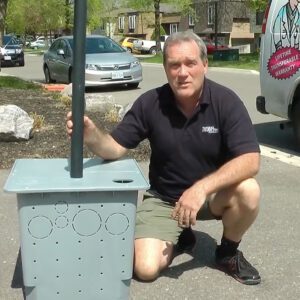Confused about what to do with your wet or leaky basement? Here’s basement waterproofing simplified to help you out. Determining which one of these solutions is right for you requires the services of an experienced basement waterproofing contractor who will assess your situation in order to suggest the best option.
What are the different types of basement waterproofing solutions available?
- Concrete crack injection: This is a simple, quick and inexpensive basement waterproofing solution for poured concrete walls. A technician will install ports in your basement cracks which will be filed with a polyurethane epoxy solution. Once this dries the cracks will be completely sealed. However, this method doesn’t work for basement walls that are composed of blocks.
- Exterior basement waterproofing system: This involves excavating the dirt around your exterior walls and using tar adhesive to seal or fill any cracks. A thick vapour barrier is then attached (you can also add insulation) and a drain tile is installed around your home. This is then covered with stone and topsoil. Not everyone is in favour of this method because the lawn has to be dug up. An experienced basement waterproofing contractor will minimize or eliminate any damage as well as restore your nice landscape.
- Interior French drain system: The contractor will clear out the basement floor about a foot away from the wall and dig a trench that is around one foot high. The trench will then be lined with a ‘soil separating’ fabric after which a Triple Wall, Schedule 40 PVC Drain Tile is installed and covered by stone. This is a time-tested basement waterproofing method which has been improved upon over the years for better performance.
With basement waterproofing solutions simplified to give you a fair understanding of your choices, it’s time to call in the experts to get the job done.
The Crack Doctor offers accredited basement waterproofing services all across Southern Ontario. We specialize in basement drainage systems and can help you install the most appropriate one for your needs. This will put an end to your wet basement issues, musty odours and the constant risk of mould.
Call us at 1-877-709-2809 today for basement waterproofing solutions simplified to meet your exact requirements.

